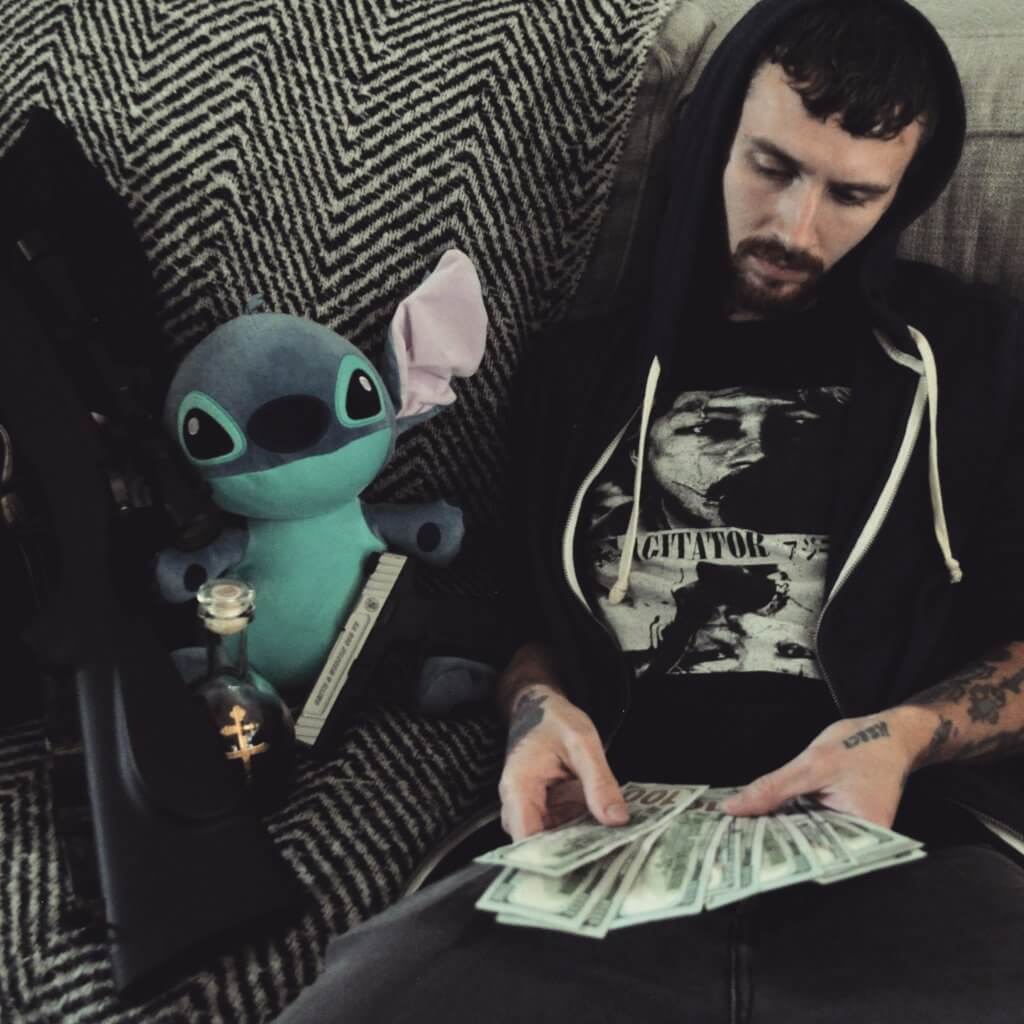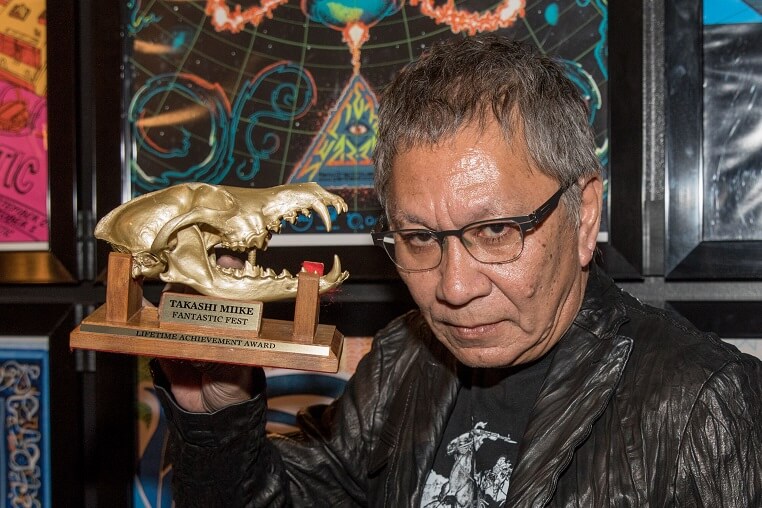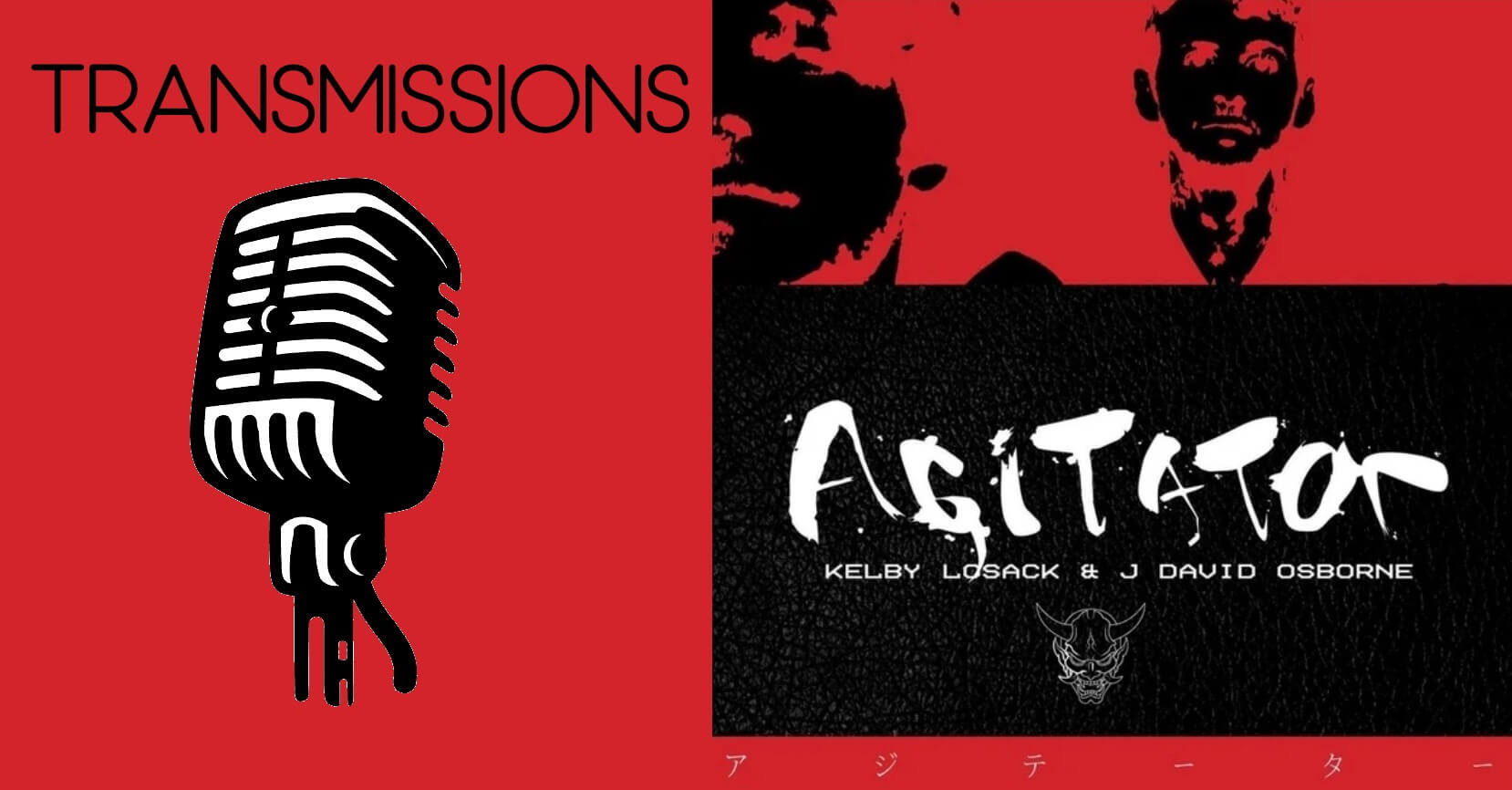Welcome to Transmissions, an interview feature in which X-R-A-Y profiles podcasts.
 Kelby Losack is a carpenter and dopeboy turned hoodrat noir and gutter cyberpunk novelist. He co-hosts the cult hit podcast Agitator with J. David Osborne and is a member of the Broken River collective. More at kelbylosack.com or on IG @kelby.losack
Kelby Losack is a carpenter and dopeboy turned hoodrat noir and gutter cyberpunk novelist. He co-hosts the cult hit podcast Agitator with J. David Osborne and is a member of the Broken River collective. More at kelbylosack.com or on IG @kelby.losack
Rebecca Gransden: How would you describe the podcast to someone who is unfamiliar with what you do?
Kelby Losack: We pitch it as “a modern retelling of the Rocky Balboa story starring two mystic juggalo weebs.” Categorically, we talk literature and writing craft through the lens of an appreciation for Japanese art. But it’s also an unfiltered real-time documentation of our come-up as independent bestselling writers. If you listen to every episode in order, it’s like an underdog story. You get the highs and the lows, the dirt and the gold.
RG: Does the podcast have a mission or manifesto?
KL: I won’t speak for my co-host J David Osborne, but for me personally, I feel the most fulfilled when we’re helping people in some way. A lot of people write in saying we’ve inspired them to just do the thing they want to do with their art, pay no attention to rules or hierarchies, or we’ve unlocked something in their craft, or they just have a good time chilling with us in their heads while at work or whatever. I want to inspire others to see the greatness in themselves and own that shit.
RG: How long has the podcast been in existence, and how have you seen it grow over that time?
KL: We’ve been at this for two and a half years now. Our first couple boosts in audience came from people getting really heated either over a controversial guest we had on or some shade we tossed at beloved authors we don’t too much care for. And that’s fine, growth is growth, no bad press and all that. But it’s evened out after just sticking it out week by week, dropping consistently and going on other podcasts to cross-pollinate the listenership. We have enough hardcore fans at this point that we’re comfortable paywalling every new episode, making it a more exclusive mysterious thing.
RG: Where did the idea for the podcast come from?
KL: J. David Osborne and I have racked up some hours on the phone, talking family and art and venting bout shit and making fun of people, and we realized at a point that we are both heavily influenced by the work of Takashi Miike, so the combination of justifying how much time we spent on the phone and having a sort of core theme to kick off with is how the show started.
RG: How did you decide upon a title for the podcast?
KL: Agitator is the title of one of Miike’s gangster epics which everyone should check out (it’s better than The Godfather). We also rub a lot of literary world dorks the wrong way, so the title kinda has a double meaning.
RG: Are there any podcasts that influenced or encouraged you to start the project?
KL: The Perfume Nationalist. They talk perfume coupled with some other art form, we talk weeb shit coupled with the craft of writing. They insist you listen to every episode to get the full scope of the show’s purpose, we do the same. And Jack Mason, host of TPN, says everything with his full chest. The show inspired both JDO and myself to be bold and commit to the bit.
RG: What episode of the podcast would you recommend to someone who is new to what you do?
KL: Episode 10—“Bullet Ballet.” It encapsulates everything the show is about—field recordings with background noise, commentary on a piece of Japanese cinema that is influential to our own art, unfiltered discussion and joking around, and live example of the struggle. I’m filling up a generator and pacing near a box fan during that episode after our power was knocked out by a hurricane.
RG: How do you go about selecting what to feature on each episode?
KL: We make it up as we go. We’ve usually decided what to talk about and who to have on just days if not hours before recording.
RG: If your podcast features guests, how do you go about finding them?
KL: A lot of people will respond to an email if you’re showing interest in what they do and offering a chill platform to talk their shit. We have a lot of homies on too, ‘cause it makes for better listening when the people chopping it up are all tight with each other. We dip into our private Discord for guests too, so patrons are often guests themselves.
RG: If you are a writer, has the podcast impacted your writing life? and conversely, has a writerly disposition influenced the podcast?
KL: Podcasting has forever cured me of being precious about writing time or having writer’s block. There’s so much commitment in podcasting, I’ve learned it doesn’t matter if I don’t feel like it or whatever, the time to do it is the time to do it. So I approach writing like that now too. I also never have a plan of what to say on a podcast, just trust the ideas will come, which also translates into the writing. Just be a vessel, trust the process, let it flow. If a writerly disposition has influenced the podcast… I mean, yeah, probably. Just in that we talk a lot about writing.
RG: Do you listen to podcasts?
KL: Hell yeah. Usually alternating week to week with either nothing but music or nothing but podcasts. The Danny Brown Show always has me cracking up, The Perfume Nationalist is the foundation of a perfect cultural manifesto, Rare Candy is my fix for everything from paranormal studies to alternative health, literature, and hot takes. I’m So Popular, System of Systems, Rune Soup, Getting Lit… I can go on and on, for real. Scroll our guest list for some people with great podcasts.
RG: What is the best podcast out there at the moment, the one you are excited for when each new episode drops?
KL: Agitator. Get up on our level.
RG: What do you dislike about podcasts?
KL: Hosts who equivocate within an inch of their life instead of saying whatever they want to say with their chest. Here’s some free sauce: if you want to host a compelling podcast, do not ever cushion your statements. Don’t be held captive by the potential backlash of your audience; focus on captivating them, for better or worse. But please, stop equivocating. It’s embarrassing.
RG: Who is your dream guest?

KL: There’s three: Danny Brown, Mike Pondsmith, and Takashi Miike.
RG: Is there a theme or subject you are burning to cover?
KL: Currently trying to incorporate the history of Screwed-Up Click into our anime and writing podcast. I’ll figure it out.
RG: Is there a podcast that doesn’t exist, but you wish did?
KL: A rap culture podcast that never mentions Drake, J Cole, or Kendrick Lamar, and never tries to get their guest caught up in snitching on themselves, and is hosted by someone who can relate to the street level side of things instead of some nerd who reads lyrics on Rap Genius. If you know of such a podcast, please tell me.
RG: Is there a podcast that exists, but you wish didn’t?
KL: No Jumper.
RG: For techheads, which single item of kit do you consider essential for the production of the podcast, and what would you say are the basics needed for those new to podcasting?
KL: If you know you have a quality show in terms of the idea and your ability to speak, please just kick that shit off with your phone or whatever you already have. As far as what we use, on our field recording noisy episodes, we call each other on the phone and individually record on TASCAMs. Or if we got a guest over Zoom, I use a Shure MV-7 mic which is what I use for narrating audiobooks and other voiceover gigs, and JDO uses a Yeti Nano which is also pretty clean. You can easily edit shit in Audacity too, which is free.
RG: If someone would like to support independent podcasts, what are the best ways to do this?
KL: Same as any independent art, tell people you enjoy it and why so they’ll check it out too.
RG: What are your plans for the future?
KL: Become an independently operated multimedia company, pushing our own books, podcast, and films. Which is what we do now (the films are in early development), so I guess the future plan is just keep doing it but become rich as hell.
RG: Are there any podcasts on a similar wavelength to your own that you would recommend to a listener who appreciates what you do?
KL: Rare Candy is all over the place and just some chill bros who are good at talking, same as us, and Mangaroos are cool people who just have a good time talking about manga. I have recommendations for days if anyone wants to hit me up.
Agitator can be found at Patreon, Podbean, and also on YouTube.

